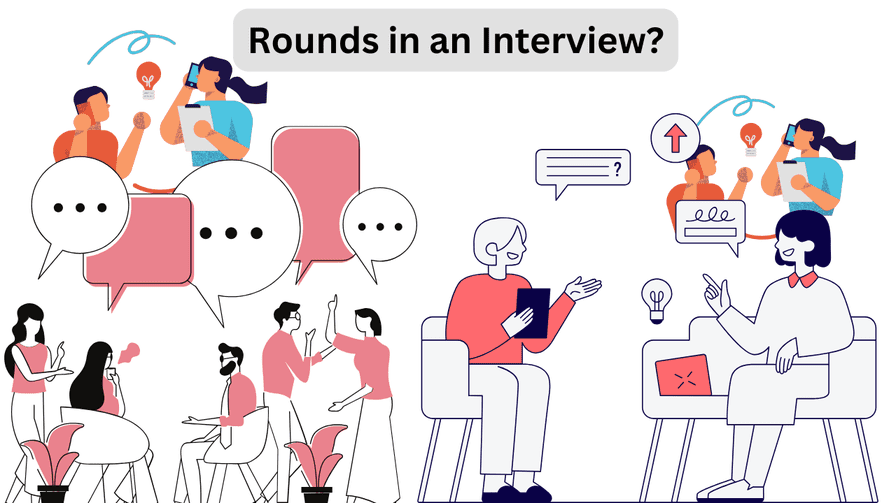
Published by College Buddy
|Wednesday, October 23, 2024
Interviews can be a nerve-wracking experience, especially for students fresh out of their Bachelor's or Master's programs. The number of interview rounds can vary depending on the company, the role, and the industry. Understanding the typical structure of interview rounds can help you prepare better and succeed in landing your dream job.
In this blog, we will break down the common interview rounds, explain what happens in each, and provide tips on how to ace them. Whether you’re a fresher or an experienced candidate, this guide will give you insights into what to expect.
The number of interview rounds usually depends on the level of the position you're applying for and the company itself. On average, you can expect 3 to 5 rounds. However, this may increase or decrease depending on the organization's hiring policies and the role’s complexity.
Let’s look at the common interview rounds for both Bachelor’s and Master’s students.
If you’ve just completed your Bachelor’s degree, companies will usually conduct multiple rounds of interviews to evaluate your fit for the role. Here’s a breakdown of the common rounds:
The first step is usually a screening round conducted over the phone or online. This round is often brief, lasting around 10 to 15 minutes. The recruiter will assess your basic qualifications, check if you meet the minimum requirements, and understand your interest in the position.
Basic questions about your education, skills, and why you’re interested in the role.
They may ask about your availability and salary expectations.
Tip: Keep your answers concise and highlight the skills mentioned in the job description.
Many companies conduct an aptitude test or a written round to assess your problem-solving abilities, reasoning, and technical knowledge. For students from technical domains, this could include coding tests, while non-technical students might face logical reasoning or general aptitude questions.
Multiple-choice questions on quantitative aptitude, logical reasoning, and verbal ability.
Domain-specific questions for technical roles.
Tip: Practice sample questions related to your domain and focus on improving your speed and accuracy.
Group Discussions are common in industries like banking, consulting, and business management. In a GD, candidates are given a topic to discuss and are evaluated on their communication, teamwork, and leadership skills.
A discussion on a current event, business scenario, or abstract topic.
Evaluators will observe your ability to communicate ideas clearly and work in a group setting.
Tip: Be clear and concise in your speech, listen to others, and contribute meaningfully to the discussion.
For technical roles, companies conduct one or more rounds of technical interviews. These are meant to assess your domain knowledge, problem-solving skills, and practical application of what you’ve learned in your Bachelor’s program.
Questions about programming, engineering concepts, or specific subjects related to your field.
For non-technical roles, the focus could be on your knowledge of the industry or role-specific skills.
Tip: Revise your core subjects and be prepared to explain projects or internships you’ve done.
The final stage is usually an HR interview. Here, the recruiter assesses your personality, cultural fit, and overall motivation for the job.
Questions about your strengths, weaknesses, career goals, and why you want to work with the company.
They might also discuss salary, benefits, and other job-related logistics.
Tip: Be honest and authentic, showing enthusiasm for the role and the company.
If you’ve completed your Master’s degree or have some experience, companies may add a few more rounds to evaluate your expertise and leadership potential.
In certain industries like consulting and finance, a case study round is included. You’ll be given a business problem and asked to present a solution.
A real-world problem scenario where you need to apply your analytical skills and subject knowledge.
They’ll assess how you approach problems, structure your thoughts, and make decisions.
Tip: Practice case studies in your domain to get comfortable with the format.
For Master’s graduates or experienced candidates, technical rounds may be more advanced, focusing on niche areas of your expertise. You could face multiple rounds, each digging deeper into your domain knowledge.
Advanced questions on your specialization or projects you’ve handled.
Scenario-based questions that test your practical knowledge.
Tip: Prepare by revising complex topics in your field and be ready to explain how you’ve applied your knowledge in real-life situations.
A behavioral interview focuses on how you've handled situations in the past. You may be asked to share examples of teamwork, conflict resolution, or leadership experiences.
Questions based on the STAR method (Situation, Task, Action, Result).
Scenarios where you demonstrated skills like problem-solving, leadership, or adaptability.
Tip: Prepare examples from your past experiences that showcase your key skills and strengths.
Suggested Posts: How to Create an ATS-Friendly Resume
Preparing for multiple rounds can be challenging, but here are a few tips to help you stay organized and confident throughout the process:
Suggested Posts: Most Asked Interview Questions for College Placements
The number of rounds in an interview can vary, but by understanding the typical structure, you can prepare effectively. Whether you’re a Bachelor’s or Master’s student, knowing what to expect in each round—from initial screenings to technical assessments and HR interviews—can give you the edge you need to succeed.
For more tips on acing your interviews and personalized career guidance, reach out to Siksha Helpline. We’re here to help you every step of the way.